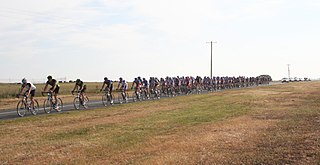
Liège–Bastogne–Liège, also known as La Doyenne, is a one-day classic cycling race in Belgium. First run in 1892, it is the oldest of the five Monuments of the European professional road cycling calendar; usually coming as the last of the spring classics. It is held annually in late April, in the Ardennes region of Belgium, from Liège to Bastogne and back.

Paris–Nice is a professional cycling stage race in France, held annually since 1933. Raced over eight days, the race usually starts with a prologue in the Paris region and ends with a final stage either in Nice or on the Col d'Èze overlooking the city. The event is nicknamed The Race to the Sun, as it runs in the first half of March, typically starting in cold and wintry conditions in the French capital before reaching the spring sunshine on the Côte d'Azur. The hilly course in the last days of the race favours stage racers who often battle for victory. Its most recent winner is Slovenian Tadej Pogačar.

The Giro di Lombardia, officially Il Lombardia, is a cycling race in Lombardy, Italy. It is traditionally the last of the five 'Monuments' of the season, considered to be one of the most prestigious one-day events in cycling, and one of the last events on the UCI World Tour calendar. Nicknamed the Classica delle foglie morte, it is the most important Autumn Classic in cycling. The race's most famous climb is the Madonna del Ghisallo in the race finale.

Cootamundra, nicknamed Coota, is a town in the South West Slopes region of New South Wales, Australia and within the Riverina. It is within the Cootamundra-Gundagai Regional Council. At the 2016 Census, Cootamundra had a population of 6,782. It is located on the Olympic Highway at the point where it crosses the Muttama Creek, between Junee and Cowra. Its railway station is on the Main Southern line, part of the Melbourne-to-Sydney line.

The Amstel Gold Race is an annual one-day classic road cycling race held in the province of Limburg, Netherlands. It traditionally marks the turning point of the spring classics, with the climbers and stage racers replacing the cobbled classics riders as the favourites.

The classic cycle races are the most prestigious one-day professional road cycling races in the international calendar. Some of these events date back to the 19th century. They are normally held at roughly the same time each year. The five most revered races are often described as the cycling monuments.

Gent–Wevelgem, officially Gent–Wevelgem – In Flanders Fields, is a road cycling race in Belgium, held annually since 1934. It is one of the classic races part of the Flemish Cycling Week, run in late March on the last Sunday before the Tour of Flanders.

Omloop Het Nieuwsblad, previously Omloop Het Volk, is a one-day road cycling race in Belgium, held annually in late February. It is the opening event of the Belgian cycling season, as well as the first race of the year in Northwestern Europe, and holds significant prestige because of it. Since 2017, the race is part of the UCI World Tour, cycling's top-tier professional events.

A cyclosportive, or often simply sportive, is a short to long distance, organised, mass-participation cycling event, typically held annually. The Italian term Gran Fondo is commonly used for these events in the United States, Australia and some other English-speaking countries.

Paris–Tours is a French one-day classic road cycling race held every October from the outskirts of Paris to the cathedral city of Tours. It is a predominantly flat course through the Chevreuse and Loire valleys; the highest point is 200 m, at Le Gault-du-Perche. It is known as a "Sprinters' Classic" because it frequently ends in a bunch sprint at the finish, in Tours. For several decades the race arrived on the 2.7 km long Avenue de Grammont, one of cycling's best-known finishing straits, particularly renowned among sprinters. Since 2011 the finish was moved to a different location because a new tram line was built on the Avenue de Grammont.

The Melbourne to Warrnambool Classic cycling race is a one-day road bicycle race. The race started in 1895 and is Australia's oldest one day race and the world's second oldest one day race, after the Liège–Bastogne–Liège Classic. Historically until 1938 the race started in Warrnambool and finished 165 miles (266 km) later in Melbourne. In 1895 the race was run in the opposite direction, from Melbourne to Warrnambool and then again from 1939. The route started in the Melbourne central business district and followed the Princes Highway to Warrnambool on Victoria's western coast. This traditional route was the longest race on the Union Cycliste Internationale (UCI) calendar, the exact distance varying slightly over time.

Wallendbeen is a small town in southern New South Wales, Australia, administered by Cootamundra-Gundagai Regional Council. At the 2011 census, Wallendbeen and the surrounding area had a population of 305. The town's name is derived from an aboriginal word for "stony hill".

Mountain bike racing is the competitive cycle sport discipline of mountain biking held on off-road terrain. The Union Cycliste Internationale (UCI) recognised the discipline relatively late in 1990, when it sanctioned the world championships in Durango, Colorado. The first UCI Mountain Bike World Cup series took place in 1988. Its nine-race circuit covered two continents—Europe and North America—and was sponsored by Grundig. Cross-country racing was the only World Cup sport at this time. In 1993, a six-event downhill World Cup was introduced. In 1996, cross-country mountain biking events were added to the Olympic Games. In 2006, cross-country mountain biking events became part of the World Deaf Cycling Championships for the first time in San Francisco, USA.

Paris–Bourges is a French road bicycle race. The race originally started in Paris and ran to the town of Bourges in the Région Centre. However, in recent year with the length of races shortened it has become impossible to link the two cities and since 1996 the race has started in the town of Gien in the Loiret department which is 130 kilometres (80 mi) south of Paris. The official name of the race is now Paris-Gien-Bourges although it is still referred to as Paris–Bourges on the UCI calendar and throughout much of the media.

The Monuments are five classic cycle races generally considered to be the oldest, hardest, longest and most prestigious one-day events in men's road cycling, with distances between 240 and 300 km.

Dwars door Vlaanderen(English: Across Flanders) is a semi-classic road bicycle race in Belgium, held annually since 1945. The race starts in Roeselare and finishes in Waregem, both in West Flanders. Since 2017 the event is included in the UCI World Tour.
The John Woodman Memorial, otherwise known as the Wagga to Albury, is an annual bicycle handicap race that runs between the New South Wales cities of Wagga Wagga and Albury. The event was first run in the 1930s, leaving the Wagga Railway Station and travelling via Tarcutta and Holbrook to finish outside the Globe Hotel in Albury. In 1948 the race was changed to run via the Olympic Way and finish in Dean St. It ran this way until its conclusion in 1963. In 1987 the event was revived and has run every year since. The event is organised by the Albury Wodonga Cycling Club (AWCC) and for 2013, the race will be held on 28 July.

Eschborn–Frankfurt, previously Rund um den Henninger Turm Frankfurt, is an annual semi classic cycling race in Germany, starting in Eschborn and finishing in Frankfurt. The event, sometimes referred to as the Frankfurt Grand Prix, is held annually on 1 May, national Labour Day in Germany.
A Gran Fondo is a type of long-distance road cycling ride originating in Italy in 1970, and roughly translates into English as "Big Ride". Italian Gran Fondos are officially defined and certified by the Italian Cycling Federation as a bicycle event at least 120 kilometres (75 mi) long, and are individually chip-timed races with prizes for the fastest riders in each category. The starts are done en masse, and the format allows for riders of every level to participate, much like a marathon, where most participants are competing against the clock instead of other participants. Traditionally a large meal is served to the participants at the end of the event, and roads are shut down.
The London–Surrey Classic was an annual 193 km (119.9 mi) men's professional one-day road cycling race, starting and finishing in London and routed via the picturesque Surrey Hills. The first race of its kind was the London–Surrey Cycle Classic, on 14 August 2011, a 1.2 classification 140 km preparatory event for the 2012 Summer Olympics, which was won by sprinter Mark Cavendish. The men's and women's Olympic road races were held on a longer variation of the same course the following year. On 4 August 2013, the race found a permanent home as part of the Prudential RideLondon weekend, a two-day cycling festival held in London, a legacy event of the Olympics.
















